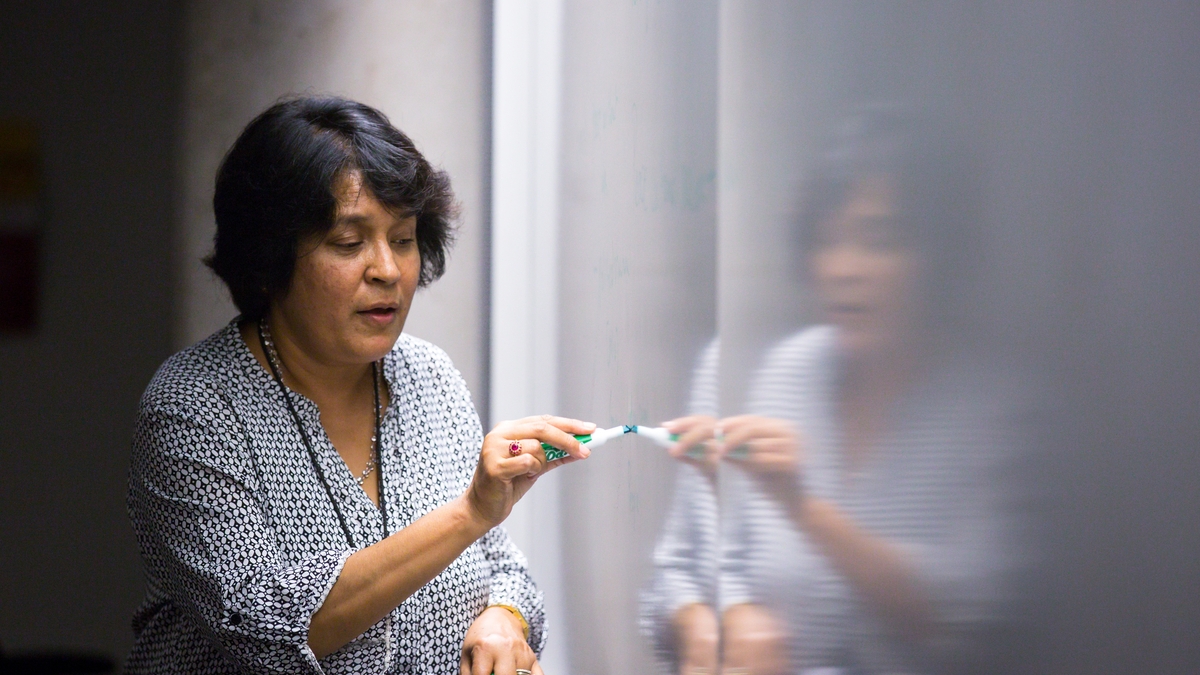Peacebuilder spends summers in war-torn areas

History professor Yasmin Saikia lectures in her HST 302 - Topic: Peace Studies class in Coor Hall, on Tuesday, Aug. 25, 2015. Saikia is the Hardt-Nickachos Chair in Peace Studies at the University.
For most people, the thought of spending your summers in war-torn areas of conflict isn’t too appealing. But for Yasmin Saikia it’s more than an attraction, it’s her job.
Three months out of the year, Saikia lives abroad, often in places experiencing war or its aftermath. She does this to educate herself about how humanity can persist despite years of violence, destruction and mayhem.
“It enables me to appreciate the resilience of human communities and see the continuity of life under the rubble of violence,” said Saikia, who is a professor in Arizona State University’s School of Historical, Philosophical and Religious Studies.
“I cannot grasp the depth of their pain because often it is unfathomable. But I can express solidarity and empathy; these are human emotions that do not need language for communication.”
Saikia is the first holder of the Hardt-Nickachos Chair in Peace Studies in the Center for the Study of Religion and Conflict, and she is considered one of the country’s most innovative scholars on peace-building. She also knows firsthand the wreckage of war, having seen and experienced the horrors of war and uprising in Bangladesh as a child there during the early 1970s.
“A vivid memory I have of the war of 1971 were the ‘blackouts,’ ” Saikia said. “All the windows and skylights in our home had to be covered with thick black paper so that light would not reflect from them and make us vulnerable to enemy attack planes.”
In addition to the blackouts, Saikia’s family endured food rationing and witnessed ethnic and linguistic violence against immigrant Bengali communities. Saikia said her family was somewhat protected as her parents were professors and lived on a university campus. Her family provided shelter and protection to many Bengali students, which gave Saikia an early insight into the refugee psyche.
“I think these early childhood memories made me empathetic to the condition of others, as well as made me realize we can play a positive role in improving human relationships for creating peaceful conditions in the world,” Saikia said. “They shaped my own higher education and the topics I chose to research. My education and research have made me a scholar of history and peace.”
After completing a doctorate at the University of Wisconsin-Madison, Saikia became the first South Asian historian at the University of North Carolina-Chapel Hill. It was there where she began studying the effects of violence and war on women and children.
“The vulnerability of women during war is more evident because women are not only exposed to physical violence, but they can be sexually attacked, brutalized and dehumanized in the process,” Saikia said. “Women also have the added responsibility of taking care of young children, who are the most likely victims of war – from starvation, psychological trauma and loss of home, parents and guardians.”
In 2011 Saikia became the first scholar to hold the title of Peace Chair at ASU, which is what drew her to Arizona. She has originated several new classes in peace studies at ASU, including one on Gandhi and the politics of nonviolence and other peace movements in the Muslim world.
Saikia’s output since she has been in Tempe is prolific and impactful. In those four years she has hosted two international conferences, launched a film series and has written several peer-reviewed articles and one book – “Women and Peace in the Islamic World: Gender, Agency and Influence.”
The work is believed to be the first scholarly book devoted to Muslim women’s efforts on peace. Her most current project, “People’s Peace,” is a collaboration of workshops, panel discussions and conferences that involves scholars and peacebuilders from many different countries. She is currently writing a new book on this same topic.
She has also spent some time traveling to the globe’s war-torn pockets, having spent her summers in Malaysia, Bosnia and Croatia, Cyprus and Northern Ireland – in successive years.
This past summer Saikia was in Turkey and Paris studying the January 2015 Charlie Hebdo shooting, where 11 people were killed and 11 others were injured at the satirical weekly newspaper offices targeted by an Islamic terrorist group. Saikia said the shooting exposes a much deeper divide in French society.
“Most of the French Muslims are from Morocco, Algeria and Tunisia, countries which were previously colonized by the French,” Saikia said. “Even to this day, the French treat them like their ‘subjects.’ Masters and subjects, of course, cannot be treated equally, and thus the immigrant Muslims live on the fringe of the French communities. Although the French promoted the ideas of ‘equality, fraternity and justice’ through the 1789 revolution, I am afraid it did not use these ideas in practice.”
Saikia says the tension between both segments of French society was palpable but will have to work it out if they want to live side-by-side because their histories are so intertwined. She says what’s happening between the French and Muslim communities is also a lesson that America must eventually embrace, and it is the first step towards peace.
“For this we need education and must expose our students and those around us to the richness of cultures and communities, histories and traditions that surround us,” Saikia said. “Peace is not a theory; it is a lived practice.”